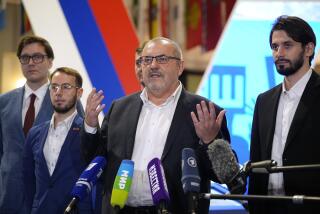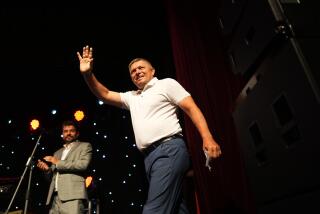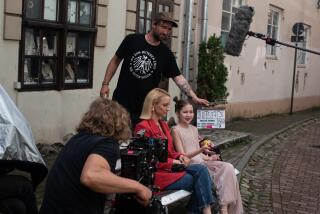Lithuania Voters Appear Poised to Reinstate a Moscow Minion
- Share via
VABALNINKAS, Lithuania — When Valentina Papaureliene casts her ballot today, the plump waitress at this little town’s milk bar plans to back Lithuania’s former Communist Party boss as the country’s first popularly elected post-Communist president.
She is aware of the irony here: The Baltic republic that helped lead the fight against Kremlin domination is now poised to reinstate one of Moscow’s minions.
But “there were good Communists and there were bad Communists,” she said, cleaning rag in hand as she leaned against the bar. And ideology is not the point now.
“The main thing is agriculture, because it is all a wreck,” she said. “The spring after this one, we could end up with nothing to eat.”
Three years after they shook the world by declaring their independence from a still-fearsome Soviet Union, Lithuanians are turning away from fiery nationalism in search of some economic relief.
That search has led many back to Algirdas Brazauskas, 60, the barrel-chested, silver-haired former Communist leader considered the front-runner in today’s election for the newly instituted post of president.
Brazauskas’ opponent, Stasys Lozoraitis, is his polar opposite in terms of background. Currently the Lithuanian ambassador to the United States, Lozoraitis spent most of his life in the West, advancing the cause of Lithuania’s freedom.
“He is the only clean Lithuanian, not dirtied by communism,” said one supporter.
But the past is not as much an issue in this election as the painful present.
The Baltic countries of Latvia, Lithuania and Estonia, once the richest of the Soviet republics, are struggling to keep their economies afloat now that Russia no longer supplies them with cheap fuel and an eager market for their industrial goods.
In Lithuania, post-Soviet economic ills were compounded by a hasty agricultural reform a year ago that broke up collective farms and redistributed the land, in part to pre-Soviet owners, before private farmers were up to speed. Food production plummeted by more than 30% in the last year, and industrial production by about half, according to official estimates.
“The collapse of agriculture is our own fault. We can’t blame anybody else for it,” Parliament spokesman Vilius Kavaliauskas said.
The 3.7 million Lithuanians could curse Russia for their under-heated apartments and the lack of hot water these subfreezing days, but they blame their own government for skyrocketing prices and idle factories.
So in parliamentary elections last fall, Lithuanian voters turned their backs on Vytautas Z. Landsbergis, the musicologist who as chairman of Parliament led the struggle for independence, and his Sajudis movement.
Instead, they supported Brazauskas and his transformed Communist Party so strongly that, to Brazauskas’ amazement, the party won a clear majority in the Parliament, known as the Seimas. Since then, Brazauskas has been Lithuania’s acting president.
Now Brazauskas has announced that if he formally wins the presidency, he will immediately launch subsidies for agriculture, increase aid to the poor and get the economy under control.
He set the modest goal of restoring the standard of living to its 1990 level.
“If we had gone forward from the starting position of pseudo-socialism and risen from there, it would have been all right,” Brazauskas said in an interview. “But first we jumped into a well and started to flounder upward from there.”
Lozoraitis, a professorial polyglot who radiates easy diplomatic charm, said he abhors Brazauskas’ willingness to even speak of going back economically. Already, he said, Lithuania is “a 19th-Century state with a horrible bureaucracy which doesn’t understand modern times.”
He emphasized, instead, Lithuania’s desperate need to attract investment capital both from the 1 million ethnic Lithuanians living abroad and from domestic business people.
Brazauskas “is looking back, I’m looking forward,” Lozoraitis said, calling Brazauskas’ apparent nostalgia “ghastly.”
Although the two candidates’ platforms differ little in essence, their rivalry carries deep symbolic significance. Lithuanians seem to face a choice between a pragmatist in the mold of Russian President Boris N. Yeltsin or a total rejection of the Soviet past in favor of a promised jump into Western modernity.
While Brazauskas found his firmest support in the countryside and among ethnic Slavs, who make up nearly 20% of Lithuania’s population, Lozoraitis was the favorite among students, former dissidents and the priests of the powerful Roman Catholic church here.
“Brazauskas’ team is red even now,” pensioner Alfonsas Vilimas said. “How can we support him? No way, no how. Lithuania should be Lithuania, not a protectorate or a colony.”
“We still have the smell of the past,” Vilimas said. “We need Lozoraitis like a clean wind.”
In the milk bar in Vabalninkas, however, Papaureliene said she doubts that anyone who has not experienced the Soviet regime can understand and lead Lithuania.
“He didn’t grow up with us,” she said of Lozoraitis, who spent only his high school years in Lithuania. “Our world and the world of Lozoraitis are very different.”
The most recent opinion poll showed Brazauskas ahead with 51% compared with 29% for Lozoraitis.
Gintaras Gasiunas, a customs inspector who lives in Vabalninkas, said an informal poll showed that two-thirds of the officers at his post support Lozoraitis.
“Brazauskas doesn’t speak to his old ties, he’s really for a free Lithuania,” Gasiunas said as he stood on the public square with several dozen townspeople waiting for Brazauskas to make a whistle stop there. “But if Lozoraitis wins, we’ll get more aid and get back on our feet faster.”
He has to nod, however, at Brazauskas’ campaign speech.
“People ask me, ‘How can we live now?’ ” Brazauskas, clutching daffodils and lilies, told the pale, kerchiefed women and thin men who gathered around him. “How can a person live if he can’t pay for meat and milk?”
Well, he said, “That’s how it is now. The main thing is that we’re an independent people. And whoever is elected president will have to finish recreating Lithuania as a country.”
More to Read
Sign up for Essential California
The most important California stories and recommendations in your inbox every morning.
You may occasionally receive promotional content from the Los Angeles Times.










